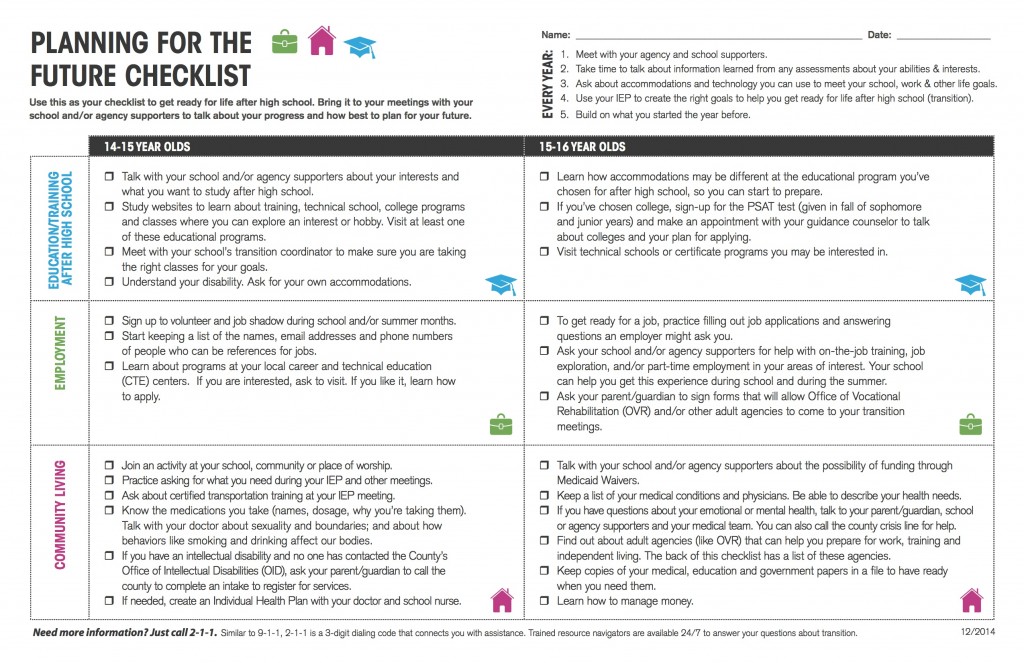Secondary Transition
Transition: Planning for Life Beyond High School
Transition is the official term for a set of activities that creates a bridge between school and adult life for students. Transition services help students become a part of the adult community – get ready for work and other aspects of adult life, obtain further education, etc. The Transition years (age 14 to 21) can be a challenging time for parents and students who are Deaf or Hard of Hearing. Some of the questions often asked include:
- What will I do after graduation?
- Will I be able to get a job?
- Which agencies will help me?
- How do I chose a post secondary program? Should I receive more education or training? What is available and how much does it cost?
- Will I be able to live independently in the community? Which agencies can help me in this process?
- How do I access financial aid?
- How do I get a sign language interpreter?
- Where can I find information about job fairs or current job openings in the area?
- What supports are available for adults with hearing loss?
Transition Starts at Age 14
Transition is a requirement of federal law (Individuals with Disabilities Education Improvement Act [IDEA], 2004) and the Pennsylvania Special Education Regulations and Standards. School districts are responsible for the education of students with disabilities through age 21, unless the student graduates before age 21. Beginning at age 14, students must have a Transition Plan as part of the Individual Education Plan (IEP). Transition-age students should participate in the IEP process to define realistic goals and identify agencies that can help them achieve their goals after high school.
Transition 21+
Transition means planning for life beyond high school. Although the legal guidelines of transition in special education specifically address the needs of students between the ages of 14 to 21, our WPSD transition page offers information and resources for all WPSD graduates.
If you have questions or need additional information, please contact any member of the WPSD Transition Team at your convenience. They stand ready to help you and answer your questions.
Transition Coordinator
At WPSD, the Transition Coordinator provides high school aged students with work life learning opportunities. From administering career interest inventories all the way to establishing unpaid job shadowing experiences designed specifically for the student’s interest (car detailing, tatoo artist, cookie decorating, video production/editing , orthopedic surgery to name a few). Students also receive help to apply for local, available jobs in the community whereby mock interviews are set up at school prior to going on the real interview. The Transition Coordinator partners daily with PA state OVR counselors to help the students access many tools and services that help them to prepare for the world of work such as Vocational Evaluations, Community Based Assessments, Job Shadowing/ASL interpreters for job shadows, OJTs and more. The relationship between the Transition Coordinator the OVR counselor is key essential for planning for the student’s future. The Transition Coordinator partners daily with their teammates, the School Guidance Counselor as well as the Independent Living Teacher/Work Coordinator as well as many other professionals on campus to assure each student is given unique opportunities that are created with that student in mind.
Work Training Coordinator
Pauline Dunbar, Work Training Coordinator – [email protected]
At WPSD, the Work Training Coordinator provides independent living and self-advocacy instruction and support for students of transition age in small group and 1:1 settings. Under the work training coordinator, select students participate in on the job training (OJT) placements here on campus with instructional staff.
The Western Pennsylvania School for the Deaf prepares students for life after graduation. The Transition program is an important part of the academic experience at the School. In this video, follow some of our high school students into their job shadow experience or as they enter into the workplace. In these and other opportunities, WPSD’s students receive real world knowledge about work life. Our employer partners have gone above and beyond to make sure that WPSD’s students have a very positive learning experience. The School extends its sincerest thanks to the participating employers, PA OVR, the ASL interpreters, the School’s administration and teachers and most importantly, our wonderful high school students. They are eager to learn and work all over the state! At WPSD, we prepare students for life!
Planning For the Future Checklist
Use the checklist below to get ready for life after high school. Bring it to your meetings with your school and/or agency supporters to talk about your progress and how to plan for your future. Click on the picture below to download your copy of the checklist.
Planning For College
For your convenience, we have provided a link: http://www.onlinecolleges.net/for-students/hearing-impaired-students/ that provides information about how students with hearing impairments can get college help with their academics, financially, and when entering the workforce.



